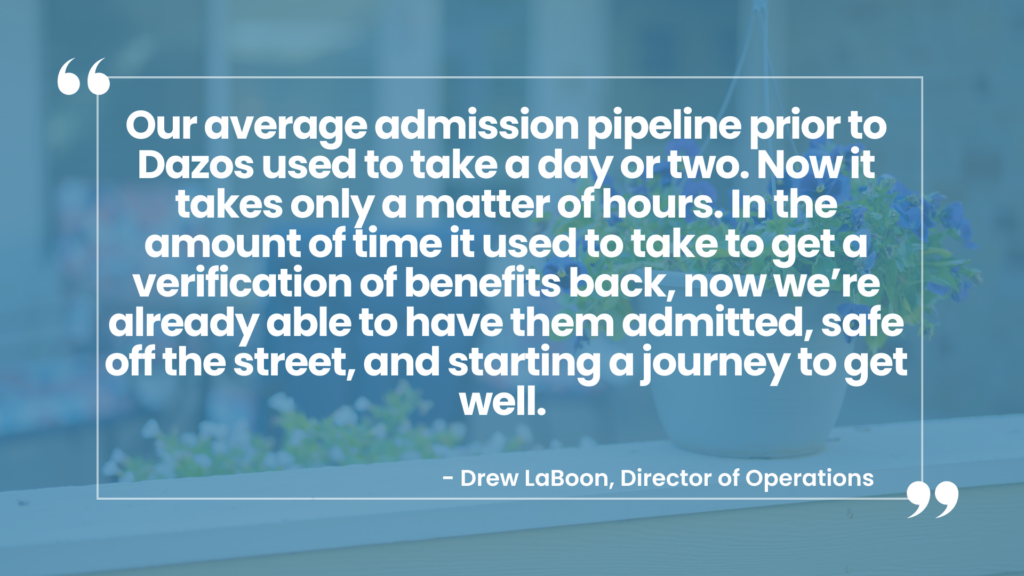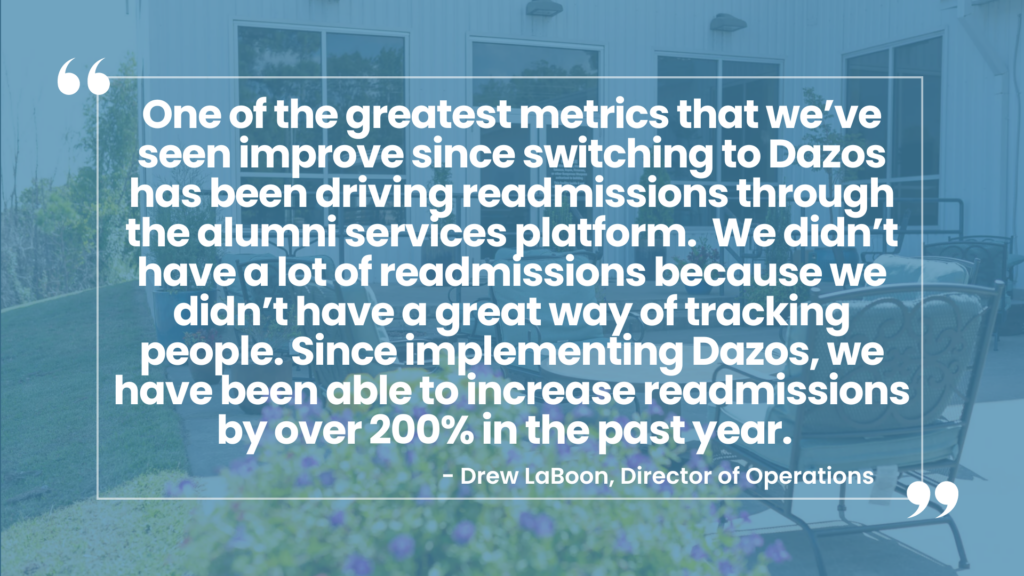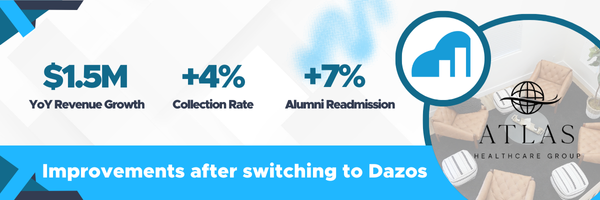September is National Recovery Month, a time to honor the incredible journeys of those overcoming addiction and mental health challenges. At Dazos, we're committed to supporting these individuals and their communities.
As a software platform built specifically for behavioral health BY behavioral health professionals, we understand the unique challenges and opportunities that treatment centers face. Our platform is designed to streamline workflows, maximize revenue, and make data-driven decisions so that you can focus on what matters most -- providing excellent care. We believe that by providing facilities with the right tools, we can help them deliver the best possible care to their patients.
Why is National Recovery Month Important?
National Recovery Month is a time to:
- Promote recovery: Showcasing the success stories of individuals who have overcome addiction and mental health challenges.
- Highlight resources: Connecting people with vital treatment options and support groups.
- Combat stigma: Challenging negative perceptions and promoting a culture of understanding and support.
How You Can Get Involved
- Learn more about recovery: Educate yourself about addiction and mental health.
- Support recovery efforts: Donate to organizations that offer treatment and support.
- Celebrate recovery: Acknowledge and celebrate the journeys of those in recovery.
- Spread awareness: Share information about National Recovery Month with your friends and family.
Together, we can make a difference.
Harmony Health Group, a leading provider of detox, residential treatment, and mental health services, has seen significant growth and improved efficiency since implementing the Dazos platform. This blog post dives into their success story, highlighting the challenges they faced and how Dazos helped them overcome them.
From Struggles to Solutions
Before Dazos, Harmony, like many healthcare organizations, relied on Salesforce, a powerful but complex CRM system.The high cost and specialized knowledge required for full implementation were major hurdles. Harmony's VP of Admissions and Growth Strategy, Mike Colasuonno, pinpoints a crucial pain point: making informed placement decisions for clients to maximize revenue. Harmony needed a system that could analyze data across various locations to ensure optimal client placement based on reimbursement rates.
Dazos: Built by Behavioral Health Professionals, for Behavioral Health Professionals
This need for a user-friendly, data-driven system led to the creation of Dazos. Mike and his team at Harmony were instrumental in beta testing and shaping the platform from the ground up. Dazos IQ addressed the placement challenge head-on, resulting in a 15% increase in average daily rate (ADR) within a year of implementation.
Harmony didn't stop there. They collaborated as a team to develop a custom CRM that addressed their specific needs. This user-friendly system streamlined data organization, improved lead follow-up, and provided insights into facility performance through staff KPIs and outcomes tracking.
Harmony Across the Platform
The true magic lies in Dazos' integrated nature. CRM data seamlessly connects with billing data in Dazos IQ, allowing Harmony to run insightful reports. They can track ROI, average time to payment, and identify any billing or utilization review bottlenecks. The platform integrates with their third-party biller as well, eliminating data duplication with iVerify.
Measurable Results and Soft Wins
Harmony has experienced a range of positive outcomes since adopting Dazos:
- Increased Revenue: A 15% increase in ADR thanks to data-driven placement decisions.
- Improved Outcomes: Alumni readmission rates soared by 700% due to the alumni dashboard's powerful tracking features.
- Enhanced Efficiency: Iverify streamlines insurance verification, saving hours of manual work.
- Usability Across Departments: The intuitive interface allows staff from various departments to leverage the platform effectively.
- Growth Enabled: Harmony's expansion from 6 to 14 programs in four years is attributed in part to the financial advantages Dazos provides.
A Win-Win Partnership
Mike Colasuonno concludes by emphasizing the uniqueness of Dazos:
"This is a tool that comes out-of-the-box in a way that was built by bh professionals for bh professionals." Dazos caters specifically to the needs of behavioral health organizations, offering a user-friendly platform that empowers admissions teams, operators, and everyone in between."
Mike Colasuonno, VP of Admissions & Growth Strategy
Harmony Healthgroup's success story is a testament to the power of Dazos. By providing a data-driven, integrated platform built for behavioral health professionals, Dazos helps organizations achieve growth, improve efficiency, and ultimately, deliver better care.
Want to see how Dazos can achieve growth in your organization? Schedule a demo today!
Pathways Recovery Centers, a Midwest leader in addiction treatment centers offering detox through outpatient programs, understands the importance of streamlining operations to focus on what matters most: patient care. But managing multiple platforms for admissions, outreach, billing, and alumni relations was proving to be a disjointed and time-consuming effort. Enter Dazos, a HIPAA-compliant platform that promised to consolidate everything under one roof.
From Chaos to Clarity: A Single Platform for All Needs
Drew LaBoon, Director of Operations at Pathways, found himself juggling a staggering four different platforms, leading to wasted time and information silos. Dazos offered a welcome solution: a user-friendly platform that could handle everything from capturing leads to verifying insurance benefits. No more third-party billers or manual data entry – Dazos promised a one-stop shop for all their needs.
The results were immediate. Verification of benefits, a process that used to take hours, now took a mere five seconds. Admissions that previously stretched over days were completed within hours.

A Dashboard that Empowers and a Feature Admissions Teams Adore
Pathways wasn't just impressed by Dazos' efficiency; they were also captivated by its customizability. The dashboard provided real-time insights into team activity and outcomes, allowing Drew to keep a pulse on the entire operation. The admissions team, in particular, raved about the seamless integration with their EMR system, a feature Drew highlighted as a game-changer.

Beyond Efficiency: Driving Down Readmission Rates
Pathways' success story extends beyond streamlined operations. Traditionally, tracking alumni and preventing relapses proved challenging. They relied on social media groups, a method Drew readily admitted as "ineffective." Dazos provided a powerful solution: a platform to stay connected with alumni and identify potential relapses early on. This proactive approach significantly reduced admission costs, which previously hovered around $3k-$5k per raw admission.
The Power of Early Intervention: Saving Costs and Saving Lives
Perhaps the most impactful outcome of implementing Dazos was the dramatic increase in readmission rates. By effectively engaging with alumni and identifying potential relapses early, Pathways was able to intervene. This not only saved the center significant costs but, more importantly, played a crucial role in the overall well-being of their patients.
Pathways Recovery Centers' story is a testament to the power of technology in revolutionizing addiction treatment. Dazos' HIPAA-compliant platform not only streamlined operations and boosted efficiency but also empowered Pathways to forge stronger connections with their alumni, ultimately leading to better patient outcomes. With Dazos by their side, Pathways Recovery Centers can confidently focus on their core mission: guiding individuals on the path to lasting recovery.
June is Men's Mental Health Awareness Month, a crucial time to acknowledge the unique challenges men face regarding mental well-being. At Dazos, a platform dedicated to empowering behavioral health facilities, we recognize the importance of fostering open conversations and dismantling the stigmas that prevent men from seeking help.
Why is Men's Mental Health Awareness Month Important?
Studies consistently show that men are less likely than women to seek treatment for mental health issues [1]. This disparity can be attributed to several factors, including:
- Societal expectations of masculinity: Traditional notions of manhood often discourage men from expressing emotions or vulnerabilities, leading them to internalize struggles.
- Limited awareness of mental health issues: Men might not recognize symptoms of depression, anxiety, or other conditions, attributing them to stress or personal failings.
- Fear of judgment: The stigma surrounding mental health can make men hesitant to seek help for fear of being seen as weak or incapable.
These factors contribute to concerning statistics: According to the American Foundation for Suicide Prevention, suicide is four times more common among men than women [2]. This stark reality underscores the need for increased awareness and support for men's mental health.
How Can Behavioral Health Facilities Make a Difference?
Mental and behavioral health facilities are uniquely positioned to play a vital role in supporting men's mental health. Here are some key strategies:
- Tailored outreach programs: Develop targeted messaging that resonates with men, addressing their specific concerns and highlighting success stories of men who have sought help
- Normalize seeking help: Create a welcoming environment that emphasizes the strength it takes to prioritize mental well-being. Utilize male therapists or support groups to provide a space for men to feel comfortable sharing their experiences.
- Offer flexible treatment options: Consider telehealth or after-hours appointments to cater to men with busy schedules or those who might feel more comfortable seeking help anonymously.
- Partner with community organizations: Collaborate with men's groups, sports organizations, or workplaces to raise awareness and reduce stigma surrounding mental health.
Moving Forward with Dazos
By implementing these strategies, mental and behavioral health facilities can actively contribute to dismantling the stigma surrounding men's mental health. At Dazos, we understand the challenges you face in reaching this population. We offer a comprehensive platform designed to streamline admissions, improve revenue cycle management, and empower your team to focus on what matters most – providing excellent care.
This June, let's pledge to create an environment where men feel supported and empowered to prioritize their mental well-being. Together, we can build bridges, shatter stigmas, and ensure that everyone, regardless of gender, has access to the mental health care they deserve.
Citations
[1] National Alliance on Mental Illness. (n.d.). Men and Mental Illness. https://www.nami.org/from-the-ceo/what-it-means-to-be-a-man/
[2] American Foundation for Suicide Prevention. (2023). Facts and Figures on Suicide. https://afsp.org/suicide-statistics/
Atlas Healthcare Group, a leading behavioral healthcare provider in Los Angeles, California, faced challenges managing patient inquiries and admissions with their old CRM system. Their previous system lacked features crucial for behavioral healthcare and caused integration headaches with their EMR and Google Ads. This led to delays, hindering their ability to act quickly on inquiries – a critical factor in the behavioral health field.
Dazos to the Rescue
Atlas implemented Dazos CRM and Dazos IQ, a powerful data analysis tool, to streamline operations and unlock valuable insights, ultimately propelling their revenue and admissions. Dazos CRM offered a user-friendly interface with built-in features specifically designed for behavioral healthcare.This eliminated the need for extensive customization and ensured a smooth workflow.
How Dazos helped Atlas Healthcare Group:
- Streamlined Operations: Dazos' user-friendly interface and features made it easier for Atlas staff to manage patient interactions and admissions.
- Seamless Integrations: Dazos integrated effortlessly with Atlas's EMR and Google Ads, minimizing delays and ensuring data flowed smoothly between systems.
- Increased Efficiency: Faster response times to inquire due to Dazos' functionality led to a higher volume of admissions for Atlas.

The Results Speak for Themselves
Atlas Healthcare Group experienced significant benefits after implementing Dazos:
- Improved Revenue Collection: Dazos IQ's claim flagging feature, a data analysis tool, helped Atlas increase their collection rate by an impressive 3.5-4%.
- Enhanced Alumni Outreach: Dazos CRM's organization and notation capabilities facilitated a 7% increase in alumni readmission rates. This translates to significant revenue gains for Atlas, totaling $1.5 million since last year!
- Reduced Lag Time: Dazos' smooth integrations eliminated delays in communication, allowing Atlas to act swiftly on inquiries and admissions, crucial for potential patients seeking treatment.
The Dazos Difference
As Sam Epstein, COO of Atlas Healthcare Group, says, "Dazos is transformational for our industry. To have everything in one place, under one umbrella has been amazing. I’m happy with Dazos because it meets the needs of our organization, specifically because it was tailored for behavioral health.”
Ready to Transform Your Behavioral Healthcare Facility?
Contact Dazos today to see how we can help significantly increase admissions, revenue, and provide powerful insights into your business.
The healthcare industry is one of the most complex and important industries in the world. It requires a high level of accuracy, efficiency, and effectiveness to deliver quality patient care and manage patient information. As a result, customer relationship management (CRM) systems have become increasingly popular in the healthcare industry to manage patient relationships and improve overall patient experience.
A CRM system is used to manage the entire lifecycle of a lead, from initial inquiry to becoming an alumnus. It ensures that each lead receives the best possible care and support throughout their journey to recovery. This means that healthcare providers can better manage their relationships with patients, improve patient satisfaction, and ultimately, improve patient outcomes.
CRM is important in healthcare industry because it can:
- Improve patient satisfaction and loyalty by providing timely and relevant communication
- Increase patient retention and referrals by offering personalized care and support
- Enhance operational efficiency and productivity by automating tasks and workflows
- Reduce costs and errors by eliminating manual data entry and duplication
- Generate insights and analytics by collecting and analyzing patient data
- What kind of healthcare services or products do you offer?
One of the key benefits of a CRM system in healthcare is that it provides healthcare providers with a 360-degree view of the patient. This means that healthcare providers can access patient information, medical history, and previous interactions with the healthcare system, all in one place. This helps healthcare providers to better understand the patient's needs and tailor their care to meet those needs.
Additionally, a CRM system in healthcare allows healthcare providers to schedule appointments and reminders, as well as track patient interactions. This ensures that patients receive the care they need on time and that healthcare providers can easily follow up with patients to ensure they are staying on track with their recovery.
A CRM system can also improve the patient experience by providing personalized care. Healthcare providers can use the information in the CRM system to personalize their interactions with patients, making patients feel valued and heard. This can lead to higher patient satisfaction and can help to build a long-term relationship between the patient and healthcare provider.
Finally, a CRM system can improve the overall efficiency and effectiveness of healthcare providers. By streamlining patient interactions, healthcare providers can reduce administrative overhead and focus on providing quality patient care. This can also reduce the risk of errors and improve patient outcomes.
Conclusion
A CRM system is an important tool for healthcare providers looking to improve patient relationships and provide quality patient care. By providing a 360-degree view of the patient, scheduling appointments and reminders, tracking patient interactions, and personalizing patient care, healthcare providers can improve patient satisfaction, reduce administrative overhead, and ultimately, improve patient outcomes.
Dazos CRM: The best CRM for Behavioral Health, Substance Abuse and Mental
Health. Save time and money with our ready-to-use solution.

